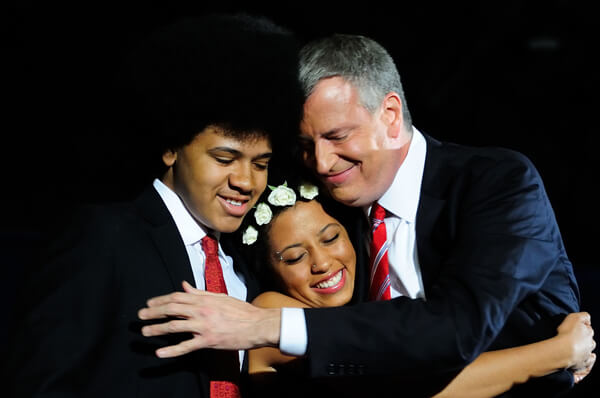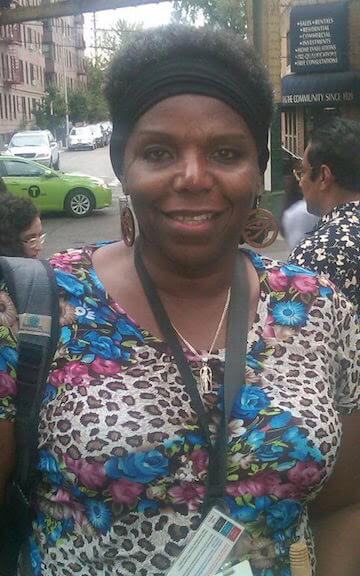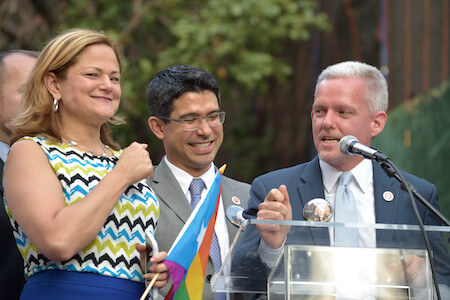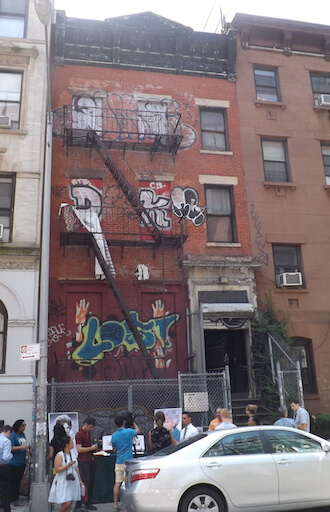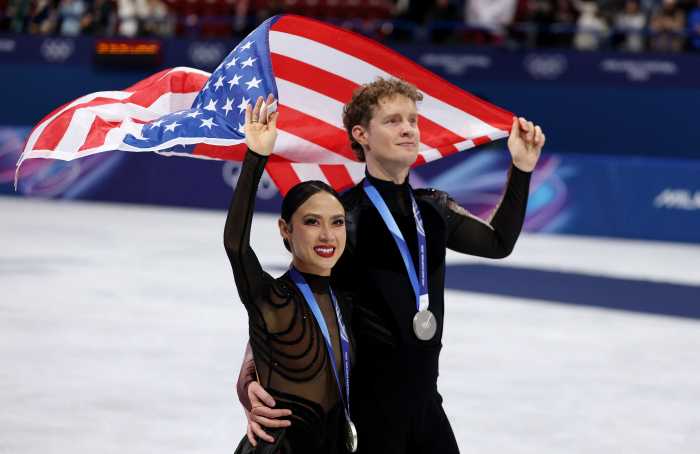Mayor-elect Bill de Blasio makes his victory speech at the Park Slope Armory on November 5. | DONNA ACETO
Standing before a cheering crowd, Democrat Bill de Blasio sounded the themes of progressive values that won him the earlier Democratic primary and that clearly appealed to a wide swath of New York City voters in the general election.
“The people of this city have chosen a progressive path and tonight we go forward on it as one city,” de Blasio told a crowd of roughly 1,000 supporters who gathered in the Park Slope Armory on November 5.
Joe Lhota, the Republican contender in the race, conceded defeat 45 minutes after the polls closed at 9:00 p.m. When the unofficial vote tabulation was nearly complete, de Blasio was shown to have captured just over 73 percent of the vote.
Exit poll data from Edison Research Services posted on the New York Times website showed de Blasio beat Lhota by large margins in nearly every demographic in the city. Lhota won white men by just two points and took Republicans and conservatives. De Blasio had a 21-percent edge among white women, however, and 83 percent of voters who identified themselves as lesbian, gay, or bisexual voted for the Democrat.
Dan Levitan, a de Blasio spokesman, said the campaign fielded thousands of volunteers at 40 get-out-the-vote sites and contacted 500,000 supporters via phone or in person in the three days prior to the election.
“We were contacting people we had identified as supporters or for various reasons we thought were our supporters,” Levitan said before de Blasio spoke.
De Blasio and his wife, Chirlane McCray. | DONNA ACETO
After eight years with Rudy Giuliani in City Hall followed by 12 years of Michael Bloomberg, the election suggests that New Yorkers have tired of the Republican mindset they represented. Lhota also lost because his campaign was barely discernible, with some pundits speculating his real intent was to mount a more serious campaign for mayor in four years.
De Blasio will have to confront expected budget deficits in the billions and must negotiate new contracts with every city union, which could cost as much as $7 billion.
“He’s left with no money in the coffer and very high expectations,” said Deborah Glick, an out lesbian who represents the West Village in the State Assembly.
Bloomberg and Giuliani claimed the mantle of fiscal responsibility. Giuliani cut taxes, doubled the city’s borrowing, and grew the size of the city’s workforce to its highest level ever. His fiscal management was so poor that Bloomberg criticized it. Bloomberg balanced the last four city budgets in part by not negotiating new contracts with the city unions. Voters may still expect fiscal discipline, even with gimmicks that Bloomberg and Giuliani used.
Brooklyn City Councilman Jumaane Williams and Manhattan State Assemblywoman Deborah Glick. | DONNA ACETO
“I think tonight will usher in a new progressive era and there’s a huge responsibility that comes with that to get it right,” said Corey Johnson, who was newly elected to represent Chelsea and the West Village in the City Council.
Johnson, who is openly gay, won a contentious Democratic primary against attorney Yetta Kurland, an out lesbian. While a lack of cash may constrain what City Hall can achieve, Johnson said that a Mayor de Blasio and the City Council could implement policies, such as mandatory inclusionary zoning, that do not require money, but have been sought by progressives.
De Blasio may also be spared political fights with the City Council or other citywide elected officials. Roughly 40 percent of the 51 City Council members will be new and they are seen as generally more left-leaning than the current Council.
Democrat Letitia James, currently a Brooklyn city councilwoman, took the public advocate’s office, and Scott Stringer, also a Democrat and the current Manhattan borough president, won the city comptroller’s office. Both have sounded progressive themes in their campaigns for those citywide offices.
In politics, however, some of the roughest fights can be among friends.
The mayor-elect hugs his two children, Dante and Chiara. | DONNA ACETO
Still the mood at the de Blasio celebration was exuberant. Carlos Menchaca, a newly elected and openly gay city councilman from Brooklyn, went dancing through the crowd trailed by a group of young people. Joining in the dancing was Antonio Reynoso, also a newly elected Brooklyn councilman. Menchaca and Johnson will join Ritchie Torres, newly elected from the Bronx, and incumbents Rosie Mendez of Manhattan and Daniel Dromm and Jimmy Van Bramer of Queens in the largest caucus of openly lesbian and gay members in the Council’s history.
De Blasio’s 19-minute victory speech had a touch of theater in it when he delivered a portion in Spanish and later added just a touch of Italian. A good measure of the speech was aimed at moderating the expectations of New Yorkers.
“Our work, all of our work, is really just beginning and we have no illusions about the work that lies ahead,” de Blasio said. “The road ahead will be difficult, but it will be traveled.”

